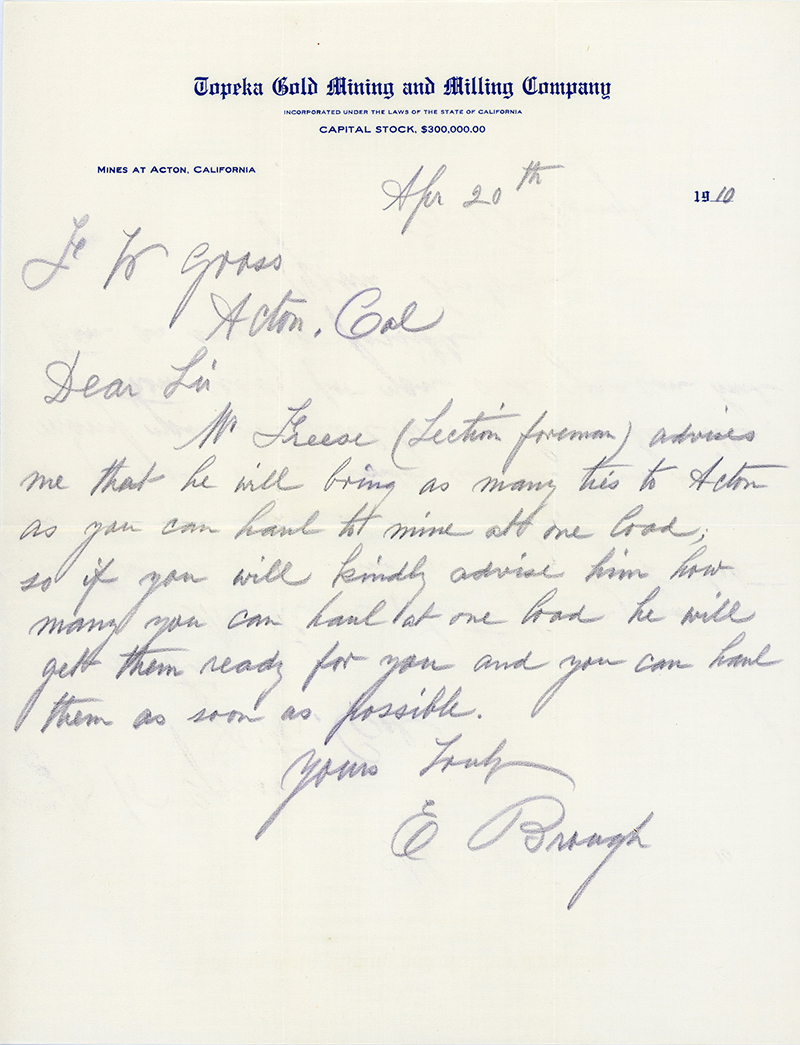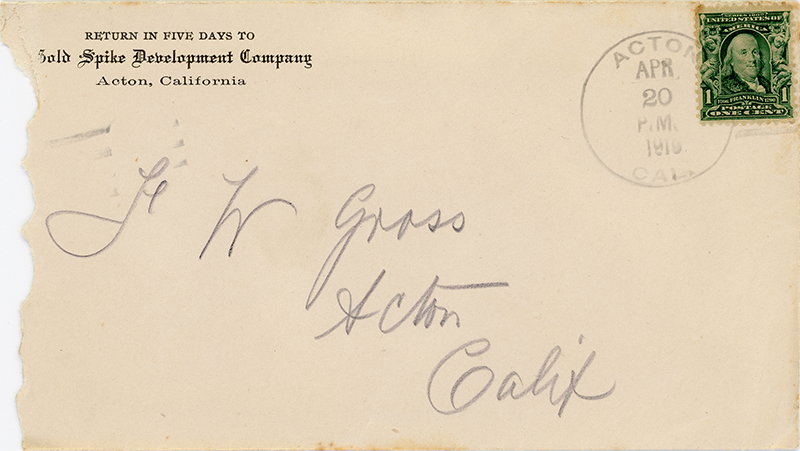|
|


Click image to enlarge
Historically significant letter, likely relating to the reopening of the Red Rover Mine after more than a decade of dormancy. Dated April 20, 1910, the letter is from Ed Brough, superindentent of Gov. Henry Gage's Red Rover Mine, to Ravenna rancher Fred W. Gross, ordering the delivery of wooden ties, which would have been used for ore cart tracks (and possibly for scaffolding within the mine). The handwritten letter, in pencil, on parchment-type letterhead of the Topeka Gold Mining and Milling Company (a California corporation) reads:
Apr 20th 1910
F.W. Gross Acton, Cal Dear Sir Mr. Freese (section foreman) advises me that he will bring as many ties to Acton as you can haul to mine at one load, so if you will kindly advise him how many you can haul at one load he will get them ready for you and you can haul them as soon as possible.
Yours Truly Fred Gross was a dairy and alfalfa rancher at Ravenna who also supplied the Southern Pacific Railroad with water for its Ravenna Station (Meryl Adams 1988:113-114).
The timing of the letter makes sense in terms of what was going on with the Red Rover. It was one of the oldest gold mines in the Acton area, having been used as early as the 1860s (ibid.:150), but it had fallen into disuse by 1897. "In the past the Red Rover was worked at full blast," the Acton Rooster reported in its December 1901 edition. "The Red Rover is too good a mine to lay idle." The Rooster reported in February 1908 that Henry Gage and Ed Brough had visited the Red Rover, and determined it should be "run for all it was worth." Then in May 1908: "Soon the whistles of the Red Rover Mining Companies will be heard again, for arrangements are being made to reopen this fine mining property. Some very rich ore has been found that will run up to the thousands." But then, "several years passed with no reports in the newspaper on the Red Rover mine," Adams writes (pg. 151). Finally in November 1911 the Rooster reported: "There are nearly twenty men employed at the Red Rover Mine. The mill is being overhauled, the water ditches and springs cleaned out, and everything is looking towards a reopening of the mine and mill." Apparently some narrow-gauge railroad ties came through, too. It took another year. The Red Rover reopened in 1912. But its most productive days were behind it. It was worked only briefly before it closed again. It would reopen once more in 1931,
when it was acquired by Francis Gage [son of Henry Gage] and his Governor Mines Co. During the 1930s the mine was worked in conjunction with the Governor Mine, yielding good amounts of gold at various intervals. The ore, averaging a modest $10 per ton in gold, was milled at the Governor mill in Acton. The Red Rover closed down in 1940 and has not been worked since
(Robinson 1973).
Back to the letter. Headquartered in Los Angeles, the Topeka Gold Mining and Milling Company was established (in 1897?) by the incorporators of the Red Rover Mine "to handle claims purchased near the Red Rover" (Los Angeles Herald, September 6, 1897). Investors in the $240 million company as of 1897 were Earl B. Millar ($56,000); Holdridge O. Collins ($48,000); Henry T. Gage ($35,000); and Joseph Gilbert, Stephen M. White, R.B. Carpenter, George J. Denis, Erskine M. Ross, J.M. Johnston and Joseph Schoder at lesser amounts. By 1910, the company was capitalized at $300 million. Consistent with the on-again, off-again history of the mine, the Topeka Gold Mining and Milling Company shows up on the state of California's 1916 list of "Corporations Forfeiting Charters, or, Forfeiting the Right to Do Business in the State of California by Reason of Failing to Pay Corporation Taxes Levied by the State Board of Equalization." The envelope (below), postmarked at Acton the same day (April 20, 1910), bears the name of the Gold Spike Development Company of Acton. The only record we've found of this entity is in the July-December 1909 volume of the Journal of Electriciy, Power and Gas (San Francisco). The entry under "Waterworks" reads:
Acton, Cal. — The Gold Spike Development Company made a contract with Smith-Booth-Usher Co. of Los Angeles to put in a large steam pump.
The back of both the letter and the envelope are blank.
LW3183: 9600 dpi jpeg from original letter and envelope purchased 2018 by Leon Worden.
|
Related Categories:
Miners & Ore Body 1890
Henry Gage & Ed Brough n.d.
Letter: Brough Orders Ties 1910
Overview 1911
5-Stamp Mill 1911 x2
New Shaft House 1911
12-14-2013 x7
|
The site owner makes no assertions as to ownership of any original copyrights to digitized images. However, these images are intended for Personal or Research use only. Any other kind of use, including but not limited to commercial or scholarly publication in any medium or format, public exhibition, or use online or in a web site, may be subject to additional restrictions including but not limited to the copyrights held by parties other than the site owner. USERS ARE SOLELY RESPONSIBLE for determining the existence of such rights and for obtaining any permissions and/or paying associated fees necessary for the proposed use.








